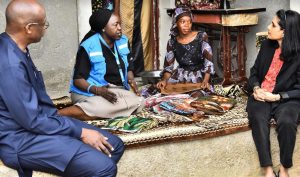Refugee crisis emerging in Nigeria
A major refuge crisis is emerging in Nigeria with 3.7 million people now forcibly displaced.
The number includes 3.6 million internally displaced people, most of who have fled Boko Haram and other militias operating in the countries north-east.
There are also around 100,000 refugees and asylum seekers from other African nations.
The conflict in northern Nigeria has been going on for more than a decade and has become increasingly violent.
Known as ‘bandits’ the militias are loosely organised armed groups, with some reports saying there are more than 120 factions with between 28 to 2,500 members.
Some are said to be deadlier than the infamous Boko Haram group, which operates in north-eastern Nigeria.
 The origins of the conflict in north-western Nigeria can be traced back to 2011 following disagreements between Hausa farmers and Fulani pastoralists over changes in land ownership and encroachment on grazing routes.
The origins of the conflict in north-western Nigeria can be traced back to 2011 following disagreements between Hausa farmers and Fulani pastoralists over changes in land ownership and encroachment on grazing routes.
The changes came primarily because of environmental and climatic factors and initially were characterised by small-scale disputes and isolated hit-and-run attacks resulting in crop damage and livestock theft.
The conflict also included skirmishes with primitive weapons, such as sticks, daggers and locally crafted guns.
But in 2018, many of the Hausa communities in the region formed “peace committees” to engage the Fulani militias.
Through these committees, they entered loose agreements to give the militias ‘protection payments’ – on levies in cash or goods in exchange for protection from attacks.
Empowered by the arrangements, the militias have tried to gouge more and more money from the villagers.
More than three per cent of the world’s 120 million forcibly displaced people are Nigerians and they are increasingly relaying on humanitarian aid to survive.
This month the UN’s refugee agency UNHCR called attention to the plight of refugees in Nigeria and the need to accelerate sustainable solutions for them.
UNHCR official Raouf Mazou commended the Nigerian government for its support for the foreign asylum seekers and pledged to increase the self-reliance of forcibly displaced people in Nigeria after a visit to the country.
The high-level visit focused on sustainable solutions while emphasising a whole-of-society approach led by the government and harnessing the expertise of diverse actors including the UN, other development partners, member states and the private sector.
“We cannot watch this protracted situation endure, with families dependent on assistance year after year,” Mr Mazou said.
“Refugees and IDPs have repeatedly told us that they would prefer a job rather than be given a handout. In the town of Banki, I met men and women who have returned home and are ready to rebuild their lives. We hear them and are helping to build livelihood opportunities.”
In practice, sustainable programming means supporting the government, helping displaced communities get back to work, ensuring they have access to government services including social safety net programmes, working closely with the private sector to create value chains, setting up innovative financial instruments to encourage investments in communities at risk, and more, Mr Mazou said.
This is in line with Nigeria’s Renewed Hope Agenda, the Sustainable Development Goals and the UN Secretary General’s Action Agenda for IDPs.
UNHCR is already working with the government to help displaced communities farm thousands of hectares of land, develop irrigation systems, tackle food security and increase rural employment.
The UNHCR delegation travelled to Benue state in the north-central region.
They also visited Borno state in the northeast, where they met returnees from Cameroon.
More than 30,000 people have returned since the start of the year and the intention is for them to also benefit from social and economic inclusion activities.
“Solutions are the highest form of protection. This requires humanitarian, development and peace partners to work together,” Mr Mazou said.












